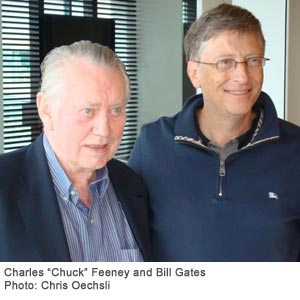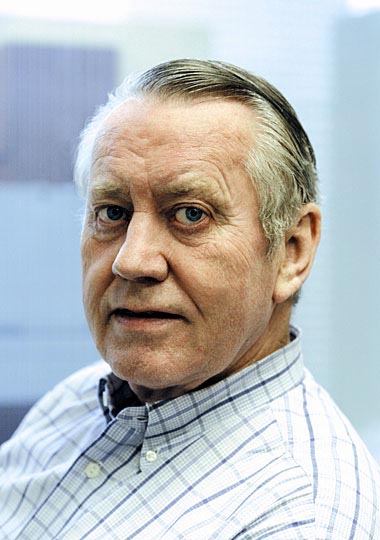Atlantic’s Founding Chairman Chuck Feeney Joins the Giving Pledge
Resource type: News
The Giving Pledge | [ View Original Source (opens in new window) ]
 Atlantic’s Founding Chairman Charles “Chuck” Feeney became the 59th signatory of the Giving Pledge, an effort conceived by Bill and Melinda Gates and Warren Buffet to invite the wealthiest individuals and families in America to commit to giving the majority of their wealth to philanthropy.
Atlantic’s Founding Chairman Charles “Chuck” Feeney became the 59th signatory of the Giving Pledge, an effort conceived by Bill and Melinda Gates and Warren Buffet to invite the wealthiest individuals and families in America to commit to giving the majority of their wealth to philanthropy.
The Gateses issued the following statement: “Chuck has been an inspiration to both of us for many years and was living the Giving Pledge long before we launched this project… He’s long been a leader in American philanthropy by his example, showing tremendous dedication and thoughtfulness in the way he approaches giving.”
Below is the letter from Mr. Feeney emphasising his commitment to both Giving While Living and the Giving Pledge.
Dear Bill,
 I greatly appreciated the recent opportunity you provided to update me on the successes and challenges of the Giving Pledge, and to allow me to share my own related thoughts and experience. As you know, shortly after the announcement of the Giving Pledge in June 2010, which followed our meeting at the first exploratory gathering in May 2009, I made an initial decision to withhold participation. Because I had already transferred virtually all of my personal and family assets to The Atlantic Foundation (the precursor to The Atlantic Philanthropies) over 25 years ago, I did not think it appropriate to be among the early signatories of this undertaking. Nevertheless, I have been carefully following the Giving Pledge initiative and am heartened by the great response. Though I cannot pledge that which I already have given – The Atlantic Philanthropies have made over $5.5 billion in grants since inception – I want now to publicly add my enthusiastic support for this effort and celebrate this great accomplishment.
I greatly appreciated the recent opportunity you provided to update me on the successes and challenges of the Giving Pledge, and to allow me to share my own related thoughts and experience. As you know, shortly after the announcement of the Giving Pledge in June 2010, which followed our meeting at the first exploratory gathering in May 2009, I made an initial decision to withhold participation. Because I had already transferred virtually all of my personal and family assets to The Atlantic Foundation (the precursor to The Atlantic Philanthropies) over 25 years ago, I did not think it appropriate to be among the early signatories of this undertaking. Nevertheless, I have been carefully following the Giving Pledge initiative and am heartened by the great response. Though I cannot pledge that which I already have given – The Atlantic Philanthropies have made over $5.5 billion in grants since inception – I want now to publicly add my enthusiastic support for this effort and celebrate this great accomplishment.
I also want now to add my own personal challenge and encouragement for Giving Pledge donors to fully engage in sustained philanthropic efforts during their lifetimes. I cannot think of a more personally rewarding and appropriate use of wealth than to give while one is living – to personally devote oneself to meaningful efforts to improve the human condition. More importantly, today’s needs are so great and varied that intelligent philanthropic support and positive interventions can have greater value and impact today than if they are delayed when the needs are greater. I urge those who are taking up the Giving Pledge example to invest substantially in philanthropic causes soon and not postpone their giving or personal engagement.
On now approaching my 80th birthday, I am content with my action, in 1982, to establish The Atlantic Foundation. I am convinced this was a sensible means for directing to good purpose a large and increasing wealth that exceeded my and my family’s lifetime needs and which I believe would have become problematic. Reflection on the many worthwhile undertakings that these funds have since made possible always reaffirms for me the prudence of this decision. The process of – and, most importantly, the results from – granting this wealth to good causes has been a rich source of joy and satisfaction for me and for my family. Beginning with little more than a few nascent ideas, the experience of having made a few sizeable donations, and a passionate interest in assisting those whose life circumstances or experience resulted in deficit or vulnerability, I have been fortunate that many others with a wide range of backgrounds and expertise have been willing to participate in and enhance this grant making endeavor over many years.
Our efforts were organized somewhat loosely at first, consistent with my preferred working style and our needs, but over time as the volume of activities expanded, the work was arranged in a more formal organization. Over the course of this journey, and alongside others who contributed enormously, I learned and came to appreciate the challenges and complexities of philanthropy. And, together, much good work has been done. I think often of, and I am truly grateful to, the many people who have contributed in so many ways to the work of The Atlantic Philanthropies over the years.
While my approach to philanthropy has surely developed and matured through experience, fundamental guides for me have always been the same methods of working and values that served me well in my business career. Key among these, I believe, is the dynamism, vigilance and informed risk taking inherent in entrepreneurial work, together with priority on good relationships and personal engagement. In business, as in philanthropy, I have always sought an independent, strategic edge where potential is often greatest, as well as opportunities that I can understand and to which perhaps I can contribute personally.
A lot is expected from us in philanthropic endeavors – and not all good initiatives will be met with universal positive acclaim – but this challenge should not divert each of us from making philanthropic investments in what we thoughtfully believe to be the highest and best use of our resources. The challenges, even set backs, I have experienced in my decades of personal engagement in philanthropy pale in comparison to the impact and deep personal satisfaction we have realized.
As I indicated at our recent meeting, I don’t pretend to have the answers to the many challenges facing those who choose to contribute their wealth to philanthropic activities. But I do have almost 30 years of personal and institutional experience engaging with the wide range of philanthropic issues and choices, and I would like to contribute this experience to the Giving Pledge effort.
Fundamental to all philanthropic efforts are choices about grant making focus and strategy, which naturally are strongly influenced by one’s passions and interests, as well as one’s perception of how best to achieve good value and lasting impact with the intended grant funds. This typically is a frequently-revisited process as one learns and gains perspective from experience and granting opportunities evolve. Another key element is the myriad decisions associated with how to conduct grant making, such as the nature, size and cost of support staff and operations. Critically, one must also navigate the complexities inherent in establishing an appropriate governance and long-term leadership structure to carry out one’s philanthropic intentions. This incorporates many aspects, such as whether or not to institutionalize a set of guiding principles; the size, role and scope of authority of an outside board, if any; the involvement of children and other family members; and the participation and function of outside advisors – and the approach decided upon must stand the test of time.
Thoughtful and effective philanthropy requires that the above issues, and more, be addressed with the same acumen, creativity and tenacity that many of us learned and applied in our business careers. Philanthropy, though, also brings with it a different set of complexities, attractions and distractions. I welcomed our initial discussions on these important issues and hope to have the opportunity to follow up on them with you and others.
My deepest thanks to you, Melinda and Warren for leading this transformative effort – and, again, congratulations on this historic achievement.
With best regards,

Charles F. Feeney
>View Chuck Feeney’s original letter
In the Media
>Long After Giving His Money Away, A Donor Takes the Pledge, New York Times, 22 Feb 2011
>Feeney Pledges His Vast Fortune to Philanthropy, The Irish TImes, 26 Feb 2011
>Chuck Feeney Signs Bill Gates’ Giving Pledge, San Francisco Business Times, 21 Feb 2011
>Atlantic Philanthropies Founder Commits To Giving Pledge, Philanthropy News Digest, 23 Feb 2011
>Feeney Joins Buffett, Gates in Billionaires’ Giving Pledge, Bloomberg, 21 Feb 2011